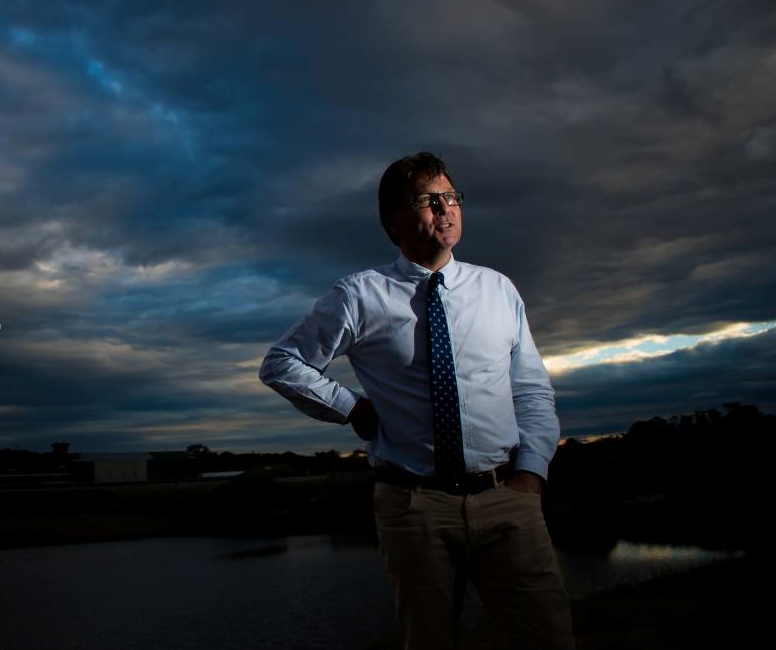
This article originally appeared in the Newcastle Herald.
A proposal to redirect millions of litres of treated effluent from Burwood Wastewater Treatment plant to Newcastle Racecourse and beyond is under consideration as part of a suite of water recycling initiatives across the region.
The ambitious proposal, costed at about $15 million, has received the backing of major stakeholder groups, including the City of Newcastle and Merewether Golf Club, which would benefit from the scheme.
Instead of being discharged into the ocean, the treated and disinfected effluent would be redirected seven kilometres from the treatment plant to a five hectare wetland reservoir in the middle of the racecourse.
From there the water would be pumped to various locations including Foreshore Park and the Broadmeadow sports and entertainment precinct.
Newcastle Racecourse chief executive Matt Benson, who initiated the proposal, said the project would slash the racecourse’s potable water consumption.
“The idea of using potable water for gardening is a bit like feeding strawberries to pigs,” he said.
Matt Benson, Newcastle Jockey Club chief executive
“Our ears pricked up a couple of years ago when we were advised there is about 50 megalitres of treated water going out to sea. There are opportunities to bring some of that water back here and use the racecourse as a distribution point.”
In addition to serving as a water reservoir, the project would also function as an environmental education centre for schools and community groups.
The proposal is based on a similar water conservation project that Mr Benson established at the Morphettville Racecourse Wetland in South Australia in the early 2000s.
The 3.5 hectare wetland located in the centre of the racecourse collects stormwater from the surrounding suburbs.
Up to 600 megalitres of water a year is recharged into the aquifer, which exceeds the amount required to irrigate the racecourse.
“There are any number of examples of these types of developments working and making a huge impact not only on water security but also community engagement,” he said.
“I’m sure there are Nazis who can work out reasons why it can’t be done, but in today’s challenging times with water security we need to look at these types of projects.”
Merewether Golf Club’s water committee chairman Ted Aitchison said the club was excited at the prospect of tapping into a recycled water pipeline running from Burwood wastewater treatment plant.
“Water is a critical issue for us,” he said.

The Newcastle Racecourse recycled water plan
“If we don’t get rain between a six week and two month period we deplete our dam which has a maximum capacity of 30 megalitres. We are then faced with buying potable water to keep watering the course. In a bad year we could spend between $30,000 to $60,000 buying potable water.”
Water Pressure:
- The endless drought is has brought Murrurundi’s residents to the brink physically and mentall
- Water policy makers scramble to ensure the Hunter has a reliable and sustainable water supply
- Record amounts of Lower Hunter wastewater is being recycled
City of Newcastle chief executive Jeremy Bath said the council was keen to explore the possibility of drawing water from the scheme to irrigate parks, gardens and sporting fields across the city.
“The purchase of potable water is a very expensive process these days for the City of Newcastle. We use about 338 million litres of potable water a year so it is a huge cost for us and it’s an unavoidable cost on the basis of the large number of parks and sporting fields we have. That said, we are very open and excited at the possibility of a commercial scale recycled water plant somewhere here in Newcastle,” he said.
“We know that they work, we know they have been done elsewhere by Hunter Water, whether it be the Vintage Golf Course in the Upper Hunter or more locally at Steel River where Hunter Water built a very successful advanced water recycling facility a couple of years ago which delivers millions of litres of water to Orica annually.”
The proposal is being assessed against several other possible water recycling projects including sewer mining and stormwater harvesting.
An August 2018 analysis of the racecourse proposal by Frontier Economics examined the financial costs associated with construction and ongoing operation of the infrastructure against the financial benefits of deferring or avoiding costs in other parts of the water and wastewater system.
Social benefits, such as improved mental and physical health as a result of greater access to green open spaces, and environmental costs, such as greenhouse gas emissions and reduced ocean outfall discharges, were also weighed up.

Potential: The existing dam in the middle of Newcastle Racecourse that could be filled with treated effluent redirected from the Burwood treatment plant.
The analysis found the proposal had an estimated Net Present Value (the difference in value between the present value of cash inflows and the present value of cash outflows) of -$7.5 million.
It concluded the project’s overall benefits did not outweigh the costs.
“Under IPART recycled water pricing guidelines Hunter Water can only recoup costs from our customer base equivalent to any avoided costs or deferral benefits to the centralised water and wastewater systems,” Hunter Water’s program director of sustainable wastewater David Derkenne wrote in a letter to Matt Benson.
“This means there is a funding gap of over $9 million for the scheme. This funding gap could be overcome by grant funding, should such a scheme become available, by users of the scheme contributing to the upfront cost, or by additional customers for the scheme being identified.”

Newcastle-based urban water consultant Peter Coombs said the social and environmental benefits of the project should be given priority.
“There are obviously infrastructure costs associated with a project like this but I think the [water] security returns and additional social returns would make it quite valuable,” he said.
“Geelong has similar demographics as the Lower Hunter and they have projects like this and they are well supported by the community.
The state government is forecast to receive a $145 million dividend from Hunter Water this year.
Newcastle MP Tim Crakanthorp urged the state government to invest a small portion of the dividend into the recycling proposal.
“Investing in recycled water projects that reduces our reliance on drinking water for irrigation purposes is critical. This saves precious resources and secures our water supply for the Hunter’s growing population,” he said.
“The government should be investing in water saving projects like this instead of ripping an additional $100 million dividend out of Hunter Water.

Tim Crakanthorp
“Merewether Golf Club and Newcastle Jockey Club understand the need to conserve precious drinking water and want to put measures in place to use recycled water for irrigation and the government should back them to do this.”
A spokeswoman for Acting Treasurer Damien Tudehope capital projects undertaken by state-owned corporations formed a part of their business-as-usual capital investment plans. Most projects were funded by the business, a natural function of the businesses commercial nature.
“Dividends from all SOCs contribute to the funding of critical services in the Hunter region and across NSW including health, education, law enforcement and public transport and roads,” she said.
“The Labor opposition should join the government in talking up Newcastle, including the new light rail, instead of constantly demonising the coal and mining industries which supports thousands of workers throughout Newcastle and the Hunter.”
Hunter Water chief information officer Darren Cleary said the racecourse proposal remained under active consideration.

Under consideration: Darren Cleary
“The main challenge with wastewater generally, compared to other water conservation measures, is that it tends to be very expensive,” he said.
“We are comparing that scheme to other investments we can make in water saving. At the moment, for example, we have got a large investment in improving the efficiency of our own water network to reduce leaks and breaks or working with our customers to reduce their water consumption. They are the trade off that we have to consider and weigh up.”
Hunter Water is working with Venues NSW to identify whether the Broadmeadow sports and entertainment precinct could provide a keystone tenant to help offset the costs associated with the scheme.
A Hunter Venues spokesman talks were underway to improve the environmental sustainability of the precinct.
“Water conservation systems have been implemented at McDonald Jones Stadium including urinal sensors, smart flush systems, storm water tanks and moisture sensors,” the spokesman said.
